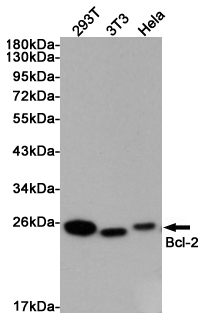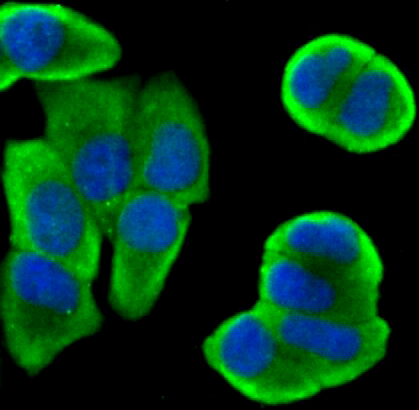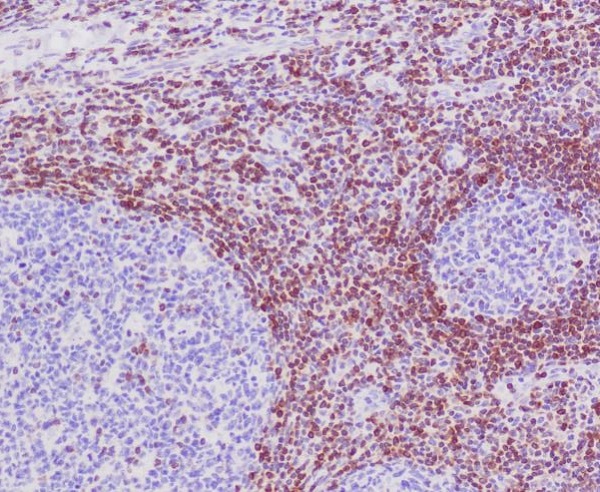


| WB | 咨询技术 | Human,Mouse,Rat |
| IF | 咨询技术 | Human,Mouse,Rat |
| IHC | 1/50-1/100 | Human,Mouse,Rat |
| ICC | 1/50-1/200 | Human,Mouse,Rat |
| FCM | 1/50-1/100 | Human,Mouse,Rat |
| Elisa | 咨询技术 | Human,Mouse,Rat |
| Aliases | BCL2; Apoptosis regulator Bcl-2 |
| Entrez GeneID | 596 |
| WB Predicted band size | Calculated MW: 26 kDa; Observed MW: 26 kDa |
| Host/Isotype | Rabbit IgG |
| Antibody Type | Primary antibody |
| Storage | Store at 4°C short term. Aliquot and store at -20°C long term. Avoid freeze/thaw cycles. |
| Species Reactivity | Human,Mouse |
| Immunogen | A synthesized peptide derived from human Bcl-2 |
| Formulation | Purified antibody in PBS with 0.05% sodium azide. |
+ +
以下是3-4篇与Bcl2抗体相关的经典文献摘要概括:
1. **《Bcl-2 gene promotes haemopoietic cell survival and cooperates with c-myc to immortalize pre-B cells》**
- 作者:Vaux, D.L., Cory, S., Adams, J.M.
- 摘要:研究利用Bcl2抗体验证其过表达可抑制细胞凋亡,并与c-Myc协同促进B细胞永生化,揭示了Bcl2在淋巴细胞发育中的关键作用。
2. **《Bcl-2 protein is topographically restricted in tissues characterized by apoptotic cell death》**
- 作者:Hockenbery, D., Nuñez, G., Milliman, C. et al.
- 摘要:通过免疫组织化学(使用特异性Bcl2抗体)发现Bcl2蛋白在具有抗凋亡能力的组织中高表达(如神经元、淋巴滤泡),支持其作为细胞存活调控因子的功能。
3. **《Immunohistochemical analysis of Bcl-2. Bcl-X, Mcl-1. and Bax in thyroid carcinomas》**
- 作者:Kommoss, F., et al.
- 摘要:采用Bcl2抗体等检测甲状腺癌中凋亡相关蛋白表达,发现Bcl2高表达与肿瘤分化程度相关,提示其作为预后标志物的潜力。
4. **《Bcl-2 oncoprotein blocks chemotherapy-induced apoptosis in a leukemia cell line》**
- 作者:Miyashita, T., Reed, J.C.
- 摘要:通过Western blot(使用Bcl2抗体)证明Bcl2过表达可抑制白血病细胞化疗诱导的凋亡,为癌症耐药机制研究提供了实验依据。
以上文献均涉及Bcl2抗体的实验应用(如WB、IHC),并探讨了Bcl2在凋亡调控及疾病中的功能。若需具体年份或期刊信息,可进一步补充。
Bcl2 (B-cell lymphoma 2) antibodies are essential tools in studying the Bcl2 protein family, which regulates programmed cell death (apoptosis). Discovered in the 1980s through its association with follicular lymphoma, Bcl2 was the first identified anti-apoptotic protein. It localizes to the mitochondrial outer membrane and counteracts pro-apoptotic family members (e.g., Bax, Bak) by preventing mitochondrial permeabilization and cytochrome c release, thereby inhibiting caspase activation.
Bcl2 overexpression is linked to cancer development, chemoresistance, and poor prognosis. Its detection via antibodies is critical in cancer research and diagnostics. Bcl2 antibodies (e.g., clone 100. 124) are widely used in immunohistochemistry (IHC), Western blotting, and flow cytometry to assess protein expression levels in tissues or cell lines. In clinical pathology, Bcl2 IHC helps differentiate lymphomas (e.g., follicular vs. reactive lymphoid hyperplasia) and evaluates apoptosis-related pathways.
Challenges include cross-reactivity with homologous proteins (e.g., Bcl-xL) and variability due to epitope masking in formalin-fixed tissues. Validated antibodies with high specificity are crucial for reliable results. Research on Bcl2 continues to inform therapeutic strategies, including BH3 mimetics that target its anti-apoptotic activity. Understanding Bcl2's role in cellular survival and disease underscores its significance as both a biomarker and a therapeutic target.
×